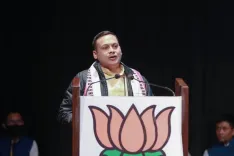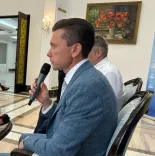How is the Delhi Assembly Speaker Advancing Digital Innovation with the UK House Team?

Synopsis
Key Takeaways
- Strategic transformation of India-UK relations through CETA and Vision 2035.
- Delhi Assembly's commitment to sustainability with net-zero carbon status.
- Over 170,000 Indian students studying in the UK.
- UK universities expanding their presence in India.
- Importance of archival access for preserving legislative history.
New Delhi, Aug 5 (NationPress) The Speaker of the Delhi Assembly, Vijender Gupta, met with a visiting delegation from the UK Parliament on Tuesday, exchanging insights regarding the legislature's advancements in digital innovation and sustainability.
During the meeting, Gupta remarked, "Our common democratic principles and historical connections are pivotal in shaping the evolving partnership between India and the United Kingdom." This interaction, led by Nusrat Ghani, the Deputy Speaker of the UK House of Commons, is a significant milestone in fortifying India-UK parliamentary relations.
The team included notable members such as Sarah Davies, Abigail Samuels, Natalia Leigh, Alexandra Knowles, Bhavna Vij, and Parul Kavia.
Gupta highlighted the strategic transformation of India-UK relations into a modern and multifaceted partnership through frameworks like the Comprehensive Economic and Trade Agreement (CETA) and the India-UK Vision 2035. He stated, "Our roadmap now encompasses trade, technology, education, defense, climate action, and innovation, reinforcing our partnership for global progress."
He also underscored the significant role of the Indian diaspora and Indian businesses in boosting bilateral economic relations.
Education was a focal point in the discussions, with Gupta noting that over 170,000 Indian students are currently pursuing their studies in UK universities. He welcomed the initiative from UK universities, like the University of Southampton, to set up campuses in India and commended the mutual recognition of academic qualifications in 2022 as a key milestone for academic mobility.
Gupta also informed the delegation about the innovative reforms at the Delhi Assembly, including the transition to a paperless legislative process through the National e-Vidhan Application (NeVA) and the establishment of a 500 kW rooftop solar power plant. He proudly noted, "We are the first Assembly in India to attain net-zero carbon status within just 100 days of the 8th Legislative Assembly."
Additionally, he discussed the ongoing restoration of the Assembly’s historic premises, which was once the seat of the British Imperial Legislative Council, as a national heritage site. He requested the delegation's support in accessing valuable archival materials from the British Council, saying, "We hope these records can be made available soon to aid our efforts in documenting and preserving the legacy of this institution for future generations."
In her remarks, Ghani expressed her gratitude for the hospitality from the Delhi Legislative Assembly and recognized both its historic significance and modern relevance. Stressing the Assembly's role as a leader in progressive institutional reform, she reiterated the importance of legislatures in addressing global challenges and called for increased people-to-people engagement and enhanced inter-parliamentary cooperation.
The meeting concluded with a reaffirmation of shared democratic values and a commitment to deeper institutional collaboration.







